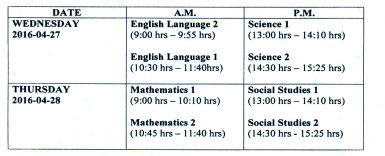According to the Ministry of Education, the decision to postpone the dates for the National Grade Six Assessment (NGSA) was made so as to “give teachers sufficient time to complete the Grade 6 curriculum and give students additional time within which to prepare for the Assessment.”
On Sunday, Stabroek News reported that the 2016 NGSA will be written on April 27 and April 28, a month after the traditional time for the annual sitting.
The NGSA has in the past been written on the Monday and Tuesday after school closes for the Easter Holidays. The new term, which will begin on January 3, 2015 will last for 11 weeks, therefore it was expected that school would officially be closed on March 18, 2016 and the examination written on March 21 and 22.

In a press release the ministry inferred that this decision is a response to requests from teachers who “for some time now…have been advocating for additional time to be granted” for completion of the curriculum.
The one-month extension also follows the fixing of March 18 as the date for local government elections. Since schools are used as polling stations there would have been disruptions to the exams if they were held at the usual time.
The Ministry’s release also reminded the public that “with immediate effect, the weighting previously attributed to the grades Two and Four Assessments will stop” these assessments will now be used “strictly for diagnostic purposes, as was initially intended.”
This decision was first communicated with teachers in a circular dated October 26, 2015. The circular amends the weighting previously announced in 2007.
As of that year, students who had written the Grade two assessment in 2003 and the grade four assessment in 2005 were awarded places at secondary schools based on a weighting of their scores at all three “assessments”. The grade two assessment was responsible for 5% of their final score, the grade four 10% while the grade six assessment was responsible for 85%.
In an invited comment after the issuing of the release, Chief Education Officer Olato Sam had explained to Stabroek News that the ministry has continuously received representation for students who were absent for the grade two and four assessments and felt that the evaluation and placement they received from the ministry was unfavourable.
These concerns he noted have led the ministry to return the assessment to their original purpose that of informing the planning necessary to overcome weaknesses pupils may have.
In its most recent release the Ministry urged “schools to put necessary systems in place for the results of these assessments to be the basis of strategic intervention aimed at overcoming identified weaknesses of pupils.”





